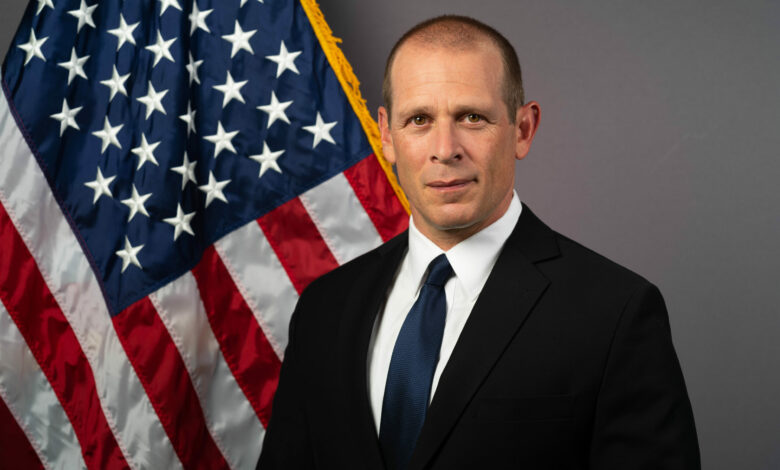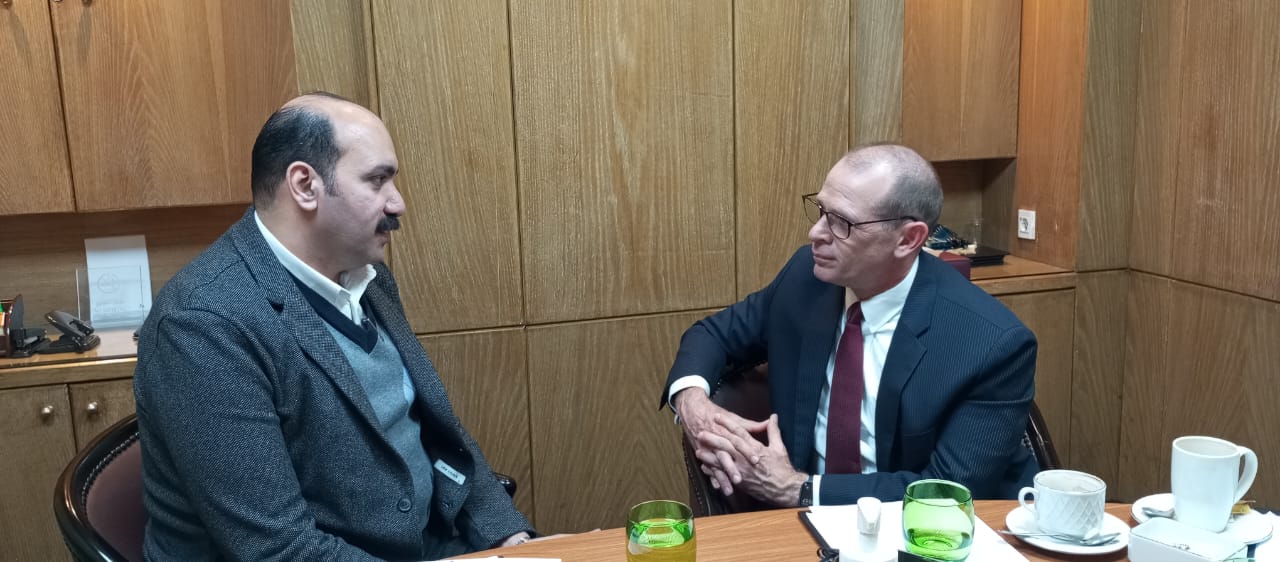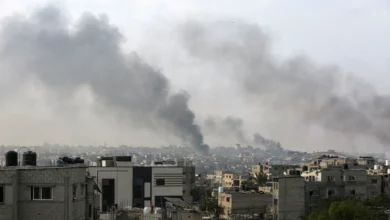
The Regional Spokesperson for the US State Department, Samuel Warberg, sat down for an exclusive interview with Al-Masry Al-Youm regarding the current status on the Gaza crisis, which Warberg assured that the US does not seek to reduce Palestine’s territories or force a displacement.
Warberg added that the US also does not wish for Gaza to be occupied, and discussed America’s plans on resolving the crisis, the path towards reconstruction, providing aid and facilitating an eventual ceasefire – while also touching on the pivotal role Egypt plays in this regard.
Firstly, how do you see Egypt’s role towards ending the war on Gaza?
Egypt is a pioneering country in peace, and plays a major role in resolving the Gaza issue through communications between President Abdel Fattah al-Sisi with US President Joe Biden, or the repeated visits of Secretary of State Anthony Blinken to Cairo.
We value Egypt’s efforts through deep cooperation, and without Egypt there would be no aid entering the sector.
Cairo also has a role in the negotiations and working to release the hostages, and we have long-term relations with Egypt on various matters.
Is there a possibility for Israel to adhere to the Security Council resolution to cease fire in Gaza?
The best way for a ceasefire is to conduct direct negotiations between Hamas and Israel through mediators in Egypt, America and Qatar, and there is no United Nations resolution that contributes to ending the war, its end or even reaching a truce, which Washington believes is important to implement for a period of six weeks.
But all of this will come through negotiations and not through American pressure or the Security Council.
However, we presented a balanced project based on the consultations of many countries, but both China and Russia exploited their veto power and did not condemn the Hamas movement, since the project is submitted by Washington.
But Moscow and Beijing rejected the US’s plans because it did not stipulate a ceasefire. Likewise, Israel does not respond to the negotiations and continues its crimes against the people of the Gaza Strip?
We did not see any condemnation from Russia or China for what the Hamas movement did last October 7, as Hamas bears responsibility.
As for the negotiations, they are continuing, and America is still optimistic about the possibility of reaching a truce to release the hostages.
We cannot speak on behalf of Israel or Hamas, as we do not have direct negotiations with the movement.
Regarding the ceasefire, the Palestinians had pinned hopes on its implementation before the month of Ramadan, and if the month is drawing to a close, should we wait for it to coincide with Eid al-Fitr? How do you describe the ongoing war? Do you see it as “genocide”? When will the war end?
The US does not have the possibility of announcing a ceasefire, rather the issue is related to the two sides of the conflict – Hamas and Israel.
Israel’s current course of action comes in response to the “Al-Aqsa Flood” operation since Tel Aviv before October 7 did not wage that war. There were 500 trucks crossing every day entering the Gaza Strip, and the current war is between Israel and Hamas and not with the the Palestinian people.
We cannot enter into speculation as Hamas hides weapons under civilian homes, and we want the Palestinian people to return to the places from which they were displaced.
Aren’t the deaths of more than 32,000 people and tens of thousands injured enough evidence that Israel is killing the Palestinian people?
We have monitored the deaths of more than 32,000 Palestinians, and there are victims on both sides.
We are not comparing the numbers – Israel has the goal of defeating Hamas and releasing the hostages, and our priorities are not to occupy the Gaza Strip, reduce the Palestinian territories, or force displacement.
America and Israel are still demanding the elimination of Hamas. If that happens, with whom will you negotiate the release of the prisoners? Is there a role for the movement in power in the future?
We want a unified Palestinian authority to provide all basic services to the Palestinian people, after the end of the war.
The Palestinian people are the ones who will decide their fate, and the decision is not in the hands of America or Israel.
We are still observing that Hamas is returning to lands that Israel previously said it controls, and I believe Hamas has no possibility of playing a future role in the post-war government.
There are constant threats from Tel Aviv to invade Palestine’s city of Rafah. What do you know of this?
We have concerns about this matter, and yet we do not yet see any clear step from Israel to invade Rafah.
We invited an Israeli team to give them advice, but Israeli Prime Minister Benjamin Netanyahu canceled the delegation’s visit, but we had the opportunity to speak with the Minister of the Israeli Army.
Does this mean that there is a disagreement between Netanyahu and Biden?
Israel and America are two sovereign states, and we have agreement and differences in viewpoints with the passage of decades.
We also want the Palestinian people to live in peace.
Will the United States participate in reconstruction?
It’s too early to talk about this matter and go into details.
For years, we have been the largest country in terms of providing aid to the Gaza Strip, and there are countries in Europe, and even the whole world, readying to aid reconstruction.
What we are currently doing is focusing on the entry of medicines and foodstuffs, whether through drop-shipping and air or sea ports, especially since the crossings were not sufficient for enough aid to enter to meet the needs of the Palestinian people.
We are still putting pressure on Israel, which has opened the Kerem Shalom crossing and the port for the entry of aid and not for crossing. The humanitarian situation is difficult, and we are using any means, whether by land or by sea or air.
Our work continues to end the war, but we must not forget that there are challenges within the sector, as there is no one who has the ability to distribute aid.
The US is accused of colluding with Israel in the war, so how can there be a hand helping Tel Aviv with weapons and trying to deliver aid to Gaza?
The relations between America and Israel are not the result of the “Al-Aqsa Flood”, but rather they have existed over the past decades and we encourage normalization with them.
There has been no change in the relationship, and when we see that Tel Aviv is exposed to danger, it is natural to support it, and in return we help the Palestinians as well like any other people.
Did the Israeli war on Gaza impact the American support provided to Ukraine?
The US is working on all issues, including the Russian war on Ukraine, Washington maintains diplomacy and through the National Security Council, is working simultaneously on multiple issues.
Washington has not and will not abandon assistance to Kiev, and Russian President Vladimir Putin thought that by entering the war, he could dismantle the North Atlantic Treaty Organization (NATO).
Instead, it has only become more powerful, allied, and organic after the accession of Finland and Sweden.
The relationship between America and Europe has also become deeper than ever before, and President Biden is focusing on alliances and strengthening them.
Every month there is a meeting between Washington and more than 50 states to support Ukraine.
So what is the solution to the Palestinian issue?
We are seeking to implement the two-state solution and establish a Palestinian state in practice and not just talk on paper.
We will not stand idly by, and a time must be set for that, but it is currently very difficult in the context of the ongoing war.
We must also account for Arab viewpoints and the Egyptian, Saudi and Jordanian ideas towards a solution.
We do not know when a two-state solution will be in place, given the lack of a unified position within Israel, especially with regard to its political parties.

Header image credit: US Department of State website.




